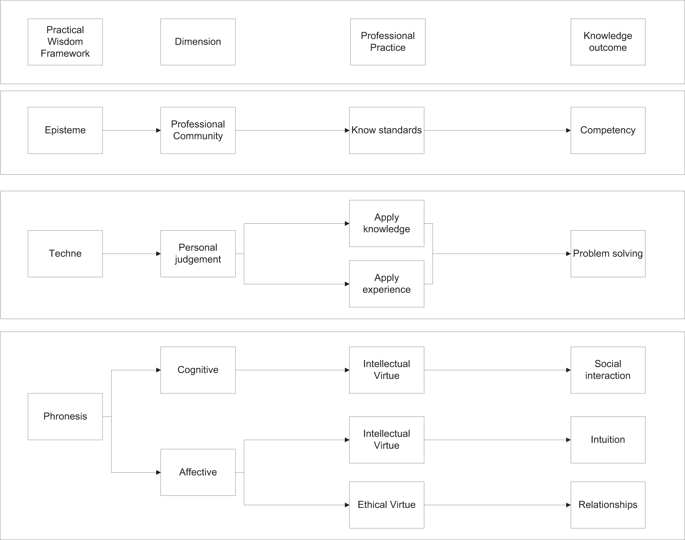Palgrave Communications Pub Date : 2019-10-22 , DOI: 10.1057/s41599-019-0331-9 Peter Massingham

|
This paper aims to improve understanding of the concept of practical wisdom. The theoretical lens used is Aristotle’s practical rationality or ‘phronesis’. Researchers argue that practical wisdom should be used as an organising framework for professional knowledge. Aristotle believed that practical wisdom as the highest intellectual virtue. Phronesis is the complicated interactions between general (theory) and practical (judgement). The contribution of this paper is to discuss the properties of practical wisdom and how they interact based on an interpretation of retirees’ knowledge. The paper summarises in-depth face-to-face interviews with nine retirees, i.e., nine separate case studies. A structured interview guideline based on a conceptual framework derived from literature was used to examine the nature of retirees’ practical wisdom. People with wisdom make better decisions. Whereas episteme’s technical knowledge may address complicated tasks, techne’s wisdom enables people to resolve truly complex tasks. Techne provides personal judgement which enables the professional to judge their actions from an external and internal perspective. Knowing that others and the individual themselves are happy with the quality of their work creates a morality that enables an inner calm and personal satisfaction leading to eudaimonia (feeling happy about life). People with wisdom behave differently. Phronesis’s cognitive properties create awareness of the knowledge that may be trusted to be seen to be behaving normally or appropriately in the organisation. The global population is ageing. This has implications for future workforce planning as experience is lost and capability gaps emerge. Retires may represent a valuable source of knowledge to help address this gap. The results are limited to nine individual case studies and four disciplines. The findings provide exciting opportunities for further research. The conceptual models may be further investigated with retirees in other disciplines.
中文翻译:

亚里士多德对实践智慧的解释:退休人员的案例
本文旨在增进对实践智慧概念的理解。理论上使用的是亚里士多德的实践理性或“通称”。研究人员认为,实践智慧应被用作专业知识的组织框架。亚里士多德认为实践智慧是最高的知识美德。Phronesis是一般(理论)与实践(判断)之间的复杂相互作用。本文的目的是讨论实用智慧的属性以及如何根据退休人员的知识解释它们之间的相互作用。本文总结了与9名退休人员的深入面对面访谈,即9个单独的案例研究。基于从文学衍生的概念框架的结构化面试指南被用来检验退休人员实践智慧的性质。有智慧的人可以做出更好的决定。认识论的技术知识可以解决复杂的任务,而技术论的智慧使人们能够解决真正的复杂任务。Techne提供个人判断,使专业人士可以从外部和内部的角度来判断自己的行为。知道他人和个人对工作质量感到满意会产生一种道德,从而使人内心平静并获得个人满足感,从而产生幸福感(对生活感到幸福)。有智慧的人的行为会有所不同。Phronesis的认知特性使人们认识到可以相信被视为在组织中正常或适当地表现的知识。全球人口正在老龄化。随着经验的流失和能力差距的出现,这对未来的劳动力规划产生了影响。退休可能是解决这一差距的宝贵知识来源。结果仅限于九个个案研究和四个学科。这些发现为进一步研究提供了令人兴奋的机会。概念模型可以与其他学科的退休人员一起进一步研究。































 京公网安备 11010802027423号
京公网安备 11010802027423号